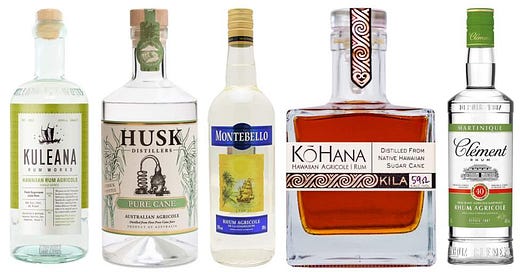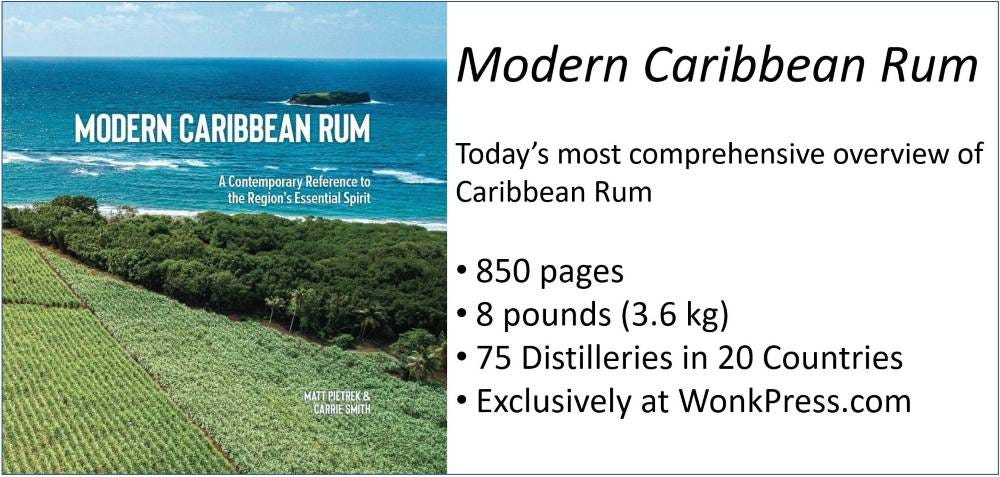I frequently see articles or posts on social media where someone says a particular rum is an agricole rum, which is then followed shortly by a flurry of comments correcting them—rightly or wrongly. It’s a hot topic among rum wonks, so let’s talk about what can or can’t be called agricole rum. You may be surprised!
On one end of the spectrum are those who think any rum made from cane juice can be called an agricole rum.
On the other end of the spectrum are those who think only cane juice rum made in Martinique can be called agricole rum, aka rhum agricole.
Neither side is completely right or completely wrong. Let’s dive into why. But first, the French word agricole translates to agricultural in English and agrícola in Spanish. You’ll see why I bring this up later in this post.
The French Connection
Martinique is a French overseas territory with an Appellation d’Origine Contrôlée (AOC) for its cane juice rum made on the island. An AOC is a type of regulation commonly known as a geographical indication. Many countries have geographical indications for their native products and what they can be called. In this example, Martinique’s AOC lays out the requirements to use the protected wording Rhum de la Martinique for rum made in Martinique.
However, Martinique isn’t the only French overseas territory making cane juice rum. Guadeloupe, Martinique’s Caribbean neighbor, has its own geographical indication, albeit slightly less constrictive than Martinique’s AOC. Guadeloupe’s GI includes this passage:
Le moût destiné à la production de « Rhum de la Guadeloupe » complété de la mention « agricole » est issu exclusivement du jus de canne.
In English: Rum labeled as agricole rum from Guadeloupe must use a cane juice ferment exclusively.
Beyond Martinique and Guadeloupe, Reunion Island and French Guiana (aka Guyane) are also French overseas territories with similar geographical indications stating that only cane juice rums can use the agricole term.
(Note: I will use GI rather than geographical indication for ease of reading for the remainder of this post.)
Scope & Enforceability
The sharp observer will note that the above-referenced GIs are French regulations, so they are only enforceable in France. In theory, any rum maker outside of France can use the word agricole on their label, regardless of how the rum was made. However, it’s not quite as simple as that.
Countries (or groups of countries) can agree to abide by certain regulations from other countries or groups of countries. Of particular interest here is the European Union and its 27 member states, e.g., France, Spain, Germany, etc.
The EU has many regulations spanning many topics that all member states abide by. (Mercifully, these regulations are available in all the native languages of EU member countries.) Among the topics of EU regulations is the recognition of GIs.
If the EU recognizes a particular GI, such as Martinique’s AOC, all member states will abide by that GI’s requirements. Thus, if a particular rum doesn’t meet the AOC’s requirements to be called Rhum de la Martinique, that bottle can’t be sold in any EU country if the bottle says Rhum de la Martinique on the label.
All of the French rum GIs have EU recognition, as does the Demerara Rum GI (Guyana), Guatemala’s rum GI, and rum GIs from several other countries.
[A brief commercial interruption: Our Modern Caribbean Rum book contains a lengthy chapter dedicated to GIs and detailed summaries of over a dozen Caribbean basin rum regulations.]
Perhaps the most important EU regulation in the spirits domain is EU 2019/787, which concerns the protection of geographical indications for spirit drinks.
The French language version of Annex I of EU 2019/787 has the following passage:
le terme «agricole», à condition que le rhum en question réponde aux exigences énumérées au point i) et ait été produit exclusivement par distillation, après fermentation alcoolique, du jus de la canne à sucre. Le terme «agricole» ne peut être utilisé que pour les indications géographiques d'un département français d'outre-mer ou de la région autonome de Madère.
The corresponding passage in the English language version of EU 2019/787 reads:
the term ‘agricultural’, provided that the rum in question complies with the requirements under point (i) and has been produced exclusively by distillation after alcoholic fermentation of sugar-cane juice. The term ‘agricultural’ may only be used in the case of a geographical indication of a French Overseas Department or the Autonomous Region of Madeira.
In brief, within EU countries, agricole can only be applied to rums made in Martinique, Guadeloupe, Reunion Island, French Guiana, and Madeira.
The keen-eyed reader will note that the French-language version above uses agricole, while the English-language version uses agricultural. The Spanish-language version uses agricola. Don’t gloss over this distinction. The EU appears to be protecting the concept of agricultural products regardless of the language used, rather than just the agricole term. Thus, one might surmise a rum labeled “Puerto Rican Agricultural Rum” might not pass the muster of the EU 2019/787 regulations. (I’m working on getting an official answer on this point.)
Outside the EU
With the above in mind, what can be called agricole rum within EU counties is quite clear. But outside of the EU, it’s a very different story.
The United States regulations regarding distilled spirits labeling include various Standards of Identity (SOI) for various spirit categories. Each SOI contains the requirements to use specific terms like bourbon, rye, gin, or vodka on the label.
The US has SOIs for Scotch whisky, Irish whisky, Canadian whisky, cognac, tequila, pisco, and several other foreign spirits. In all cases, the SOI references the regulations of the appropriate country as the authoritative source. Thus, the United States recognizes spirit GIs from Scotland, Canada, Ireland, Mexico, and various other countries.
However, not a single rum GI is recognized by a corresponding US Standard of Identity. Not Martinique, not Guadeloupe, not Jamaica, not Guyana. None of them. The only cane spirit recognized by a US SOI is Brazil’s Cachaca. It would be fantastic if the US recognized the GIs of rum-producing countries, but I don’t see it happening anytime soon. A topic for another time, perhaps.
Summary
Returning to the original question, what can be called agricole rum, the answer depends on your frame of reference. If your context is within an EU country, the answer is clear: the French overseas territories and Madeira, and only if that region’s requirements are met.
Outside of the EU, no country that I’m aware of restricts the use of agricole / agricultural / agricola on the label for rum sold within that country. (Let me know if you know otherwise.)
Some cane juice rum makers choose not to use agricole on their labels as a sign of respect for the traditions and good name of French cane juice rums. Other producers believe that agricole is synonymous with cane juice rum, so use agricole to quickly convey how the rum was made.
Whether the French and EU requirements to use agricole should be followed outside these regions is an ongoing, hotly contested debate. Some people think claiming exclusive rights to use a common term like agricultural on their label is silly. Others feel that the French overseas territories have done all the heavy lifting to raise recognition for cane juice rum, so are entitled to exclusive use of the term so closely associated with their rum.
My opinion won’t sway things one way or another; my goal with this post is to lay out the facts of the matter as simply as possible to better inform future discussions.







Out of curiosity... Any idea why Madeira is included when it is not a French territory?
As always, very clear and helpful. Thank you for your ongoing effort, Matt. I think it would be a worthwhile endeavor to try to get the US to recognize rum SOIs.